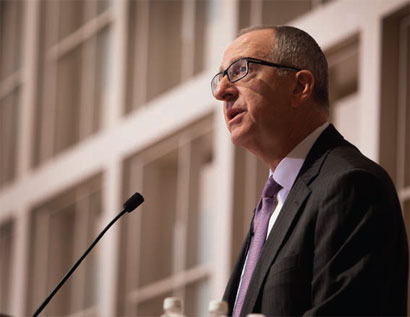The strategic plan that we adopted to guide us to the sesquicentennial and beyond has as its overarching aspiration for Cornell to be “widely recognized as a top-ten research university in the world, and a model university for the interweaving of liberal education and fundamental knowledge with practical education and impact on societal and world problems.”
Cornell now has forty-seven graduate programs ranked in the top ten of their disciplines—more than any other American university, according to Academic Analytics data. We are also making progress on the strategic plan’s seven priorities: faculty renewal; building leadership in critical fields; support of teaching; stronger connections across colleges; cost-effective enhancements to infrastructure; a more diverse faculty, student body, and staff; and connecting outreach and public engagement with research, scholarship, and education.
With half of our professors over age fifty-five, faculty renewal is a top priority. We’ve been very successful in attracting rising stars as well as senior-level colleagues. On the Ithaca campus, with about 1,600 faculty, we made seventy-one new tenure-track appointments in 2011–12, up from just twenty-seven in 2010–11. During the same time at Weill Cornell Medical College, with 1,255 full-time, salaried faculty, we made eighty-five new tenure-track appointments, compared to fifty-four in the previous academic year. We have raised $35 million for faculty renewal on the Ithaca campus over the past two years, putting us ahead of schedule toward our goal of $50 million. In addition, Weill Cornell has raised $42 million in endowment and current-use funds over the past two fiscal years for faculty recruitment.

Robert Barker/UP
Moving critically important departments and fields into positions of world leadership is also a priority. The humanities are well represented on this list, and the College of Arts and Sciences has made thirty-four new faculty appointments in humanities fields over the past two years. With the construction of Klarman Hall, expected to begin next summer, our humanists will have a beautiful, sustainably designed facility in which to pursue their scholarship and teaching in the heart of central campus.
Another priority is to “develop stronger connections across colleges.” Our new university-wide economics department brings together faculty from the Arts college and ILR, as well as selected faculty from other colleges. This new department offers a broader perspective on economics and helps us attract first-rate faculty and students.
A program linking the Department of Biomedical Engineering in the Engineering college with Weill Cornell provides clinical mentors for Ithaca-based PhD students in New York City during the summer. Cornell NYC Tech, currently in space donated by Google in Manhattan, will present additional opportunities for cross-campus—and multidisciplinary—collaboration by offering a distinctive model of graduate tech education fusing academic excellence with commercial success and societal good. And we’re delighted that a steering committee of distinguished tech entrepreneurs—New York City Mayor Michael Bloomberg, Qualcomm founder Irwin Jacobs ’54, and Google Executive Chairman Eric Schmidt—will help guide the development of Cornell NYC Tech. Plans are on track to open the Roosevelt Island campus in 2017.
Diversity in our students, faculty, and staff is another key priority. We remain among the most economically diverse American universities, ranking tenth in the nation, according to U.S. News & World Report. Our extraordinarily talented students come from a broad range of backgrounds and 124 nations. We have re-energized our diversity and inclusiveness initiatives through the “Toward New Destinations” program, which involves four broad areas: composition, engagement, inclusion, and achievement. In this first year of implementation, we committed to 158 initiatives that support diversity.
Thanks to administrative streamlining and other cost containment measures, we have recovered from the worst effects of the recession. We will continue to advance our priorities while living within our means.
Through all our challenges and opportunities, we are buoyed by the loyalty, devotion, generosity, and gentle (and not-so-gentle) prodding of alumni, parents, and friends. In the coming year, we will continue to stress participation with a new giving society—the 1865 Society—to recognize and celebrate those who support Cornell year after year. For more on our progress toward meeting our strategic goals, I encourage you to visit this website: irp.dpb.cornell.edu/strategic-metrics.
Finally, as we prepare for our sesquicentennial, we will be inviting Cornellians to participate in activities on and off campus as well as in an essay contest and a video contest. I hope many of you will join in these activities and share your perspectives on what Cornell has meant—and continues to mean—to you.


